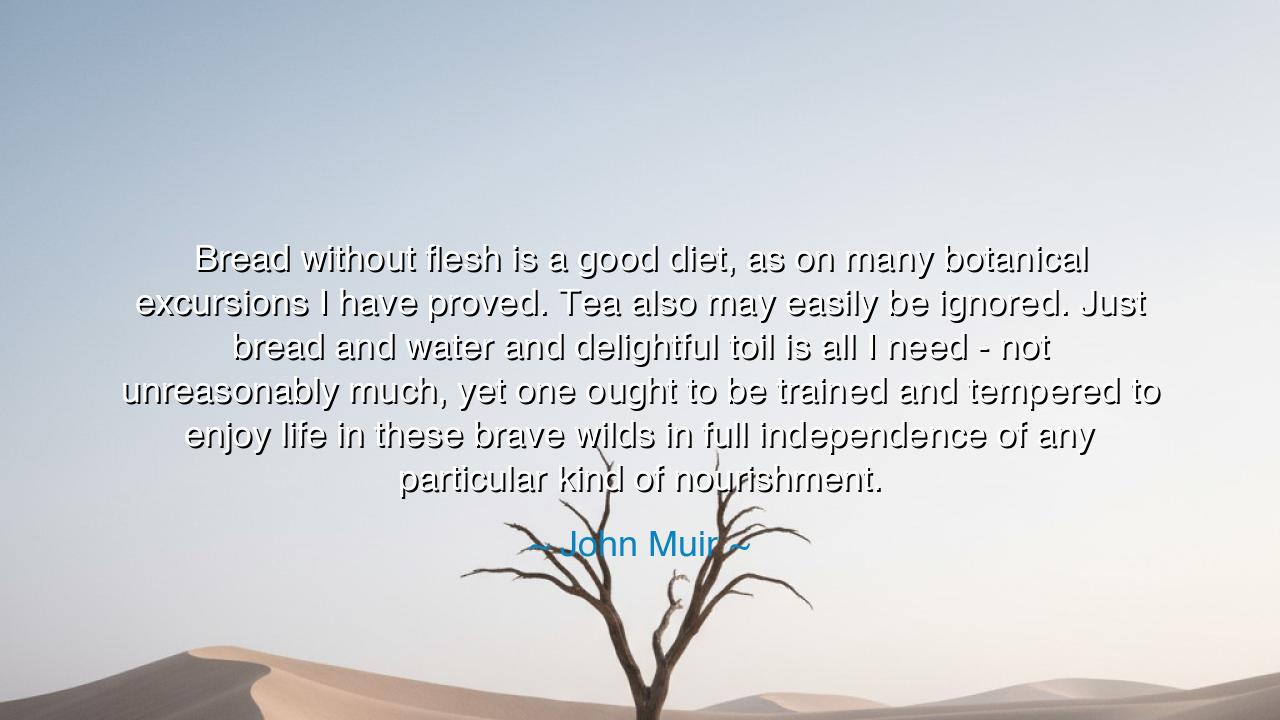
Bread without flesh is a good diet, as on many botanical
Bread without flesh is a good diet, as on many botanical excursions I have proved. Tea also may easily be ignored. Just bread and water and delightful toil is all I need - not unreasonably much, yet one ought to be trained and tempered to enjoy life in these brave wilds in full independence of any particular kind of nourishment.






In the words of John Muir, “Bread without flesh is a good diet, as on many botanical excursions I have proved. Tea also may easily be ignored. Just bread and water and delightful toil is all I need—not unreasonably much, yet one ought to be trained and tempered to enjoy life in these brave wilds in full independence of any particular kind of nourishment,” we hear the voice of a sage of the wilderness, a man who had tasted the purity of life stripped to its essence. His words are not merely about food, but about freedom—the freedom of body, of mind, and of soul. Muir speaks as one who has lived close to the earth, who has walked where the wind and river are his companions, and who has learned that joy is not born from indulgence, but from harmony with the natural order of things.
To live on “bread without flesh” is to embrace simplicity, to return to the ancient covenant between man and nature. In this simplicity there is not deprivation, but abundance of spirit. Muir, that prophet of the wild, speaks not of hunger but of sufficiency. He has found that the earth provides what is needed for the one who walks humbly upon it. Just as the hermits of the desert, the monks of the mountains, and the philosophers of Greece once lived on the barest sustenance, Muir too discovered that true nourishment comes not only from food, but from purpose and wonder. His diet was not of luxury, but of liberation.
When he writes, “Tea also may easily be ignored,” he dismisses not the pleasure of the drink but the dependence on comfort. For Muir, the essence of living lies in self-sufficiency. The ancients called this virtue autarkeia—the state of being content with little and reliant upon oneself. The Stoics of old, such as Epictetus and Seneca, taught that to need less is to be truly rich. Muir’s life in the forests and mountains was a living echo of that teaching. The less he required, the freer he became; the more he shed the trappings of civilization, the more deeply he could hear the voice of the universe whispering through the trees.
The phrase “delightful toil” is the heart of his philosophy. It is the paradox that the ancients knew well: that labor, when done in harmony with nature, becomes joy. The sweat of one’s brow becomes a hymn, and the ache of the body becomes a prayer. The farmer who tills the soil, the shepherd who guides his flock, the traveler who climbs the mountain—they all know this sacred union of work and worship. Muir, wandering alone among glaciers and redwoods, found in his toil not fatigue, but elation. His hands, roughened by nature’s challenges, held the secret that modern comfort forgets—that to struggle rightly is to live deeply.
There is also a heroic independence in his words: “one ought to be trained and tempered to enjoy life… in full independence of any particular kind of nourishment.” This is not merely a lesson in diet, but in discipline. Muir reminds us that the human being, at its best, is not fragile but formidable. Like the oak that bends but does not break in the storm, one must be hardened through simplicity and tested by challenge. The warriors of Sparta, the ascetics of India, the stoic philosophers of Rome—they all shared this truth: that comfort weakens, but simplicity strengthens. Muir’s independence was not rebellion, but reverence—the understanding that the soul grows strongest when it stands in direct communion with the world, unmediated by luxury or excess.
Consider the tale of Diogenes, the philosopher who lived in a barrel and owned nothing but a cloak, a staff, and a bowl—until one day he saw a boy drinking water with his hands. Diogenes cast away his bowl, saying, “The child has surpassed me in simplicity.” Muir, like Diogenes, had learned that happiness does not dwell in abundance but in detachment. His bread and water were enough, for his soul feasted upon the grandeur of creation—the mountains his temples, the rivers his teachers, the stars his light.
Let this be the lesson handed down: learn to be content with little, and you shall have everything. Seek the kind of strength that comes not from possession, but from purpose. Train the body to endure, the mind to quiet, and the heart to delight in the simplest gifts. When next you feel the hunger of excess—the craving for luxury, for distraction, for comfort—remember Muir’s words. Take only what you need, and give your energy instead to wonder.
Thus, the wisdom of John Muir endures like the mountains he loved: Simplicity is freedom. Discipline is joy. And the one who finds contentment in bread, water, and toil is richer than the kings of the earth. To live so is to be “tempered” by nature herself—to become unbreakable, serene, and alive in every breath. For when one no longer depends on the abundance of the world, one inherits the abundance of the soul.






AAdministratorAdministrator
Welcome, honored guests. Please leave a comment, we will respond soon